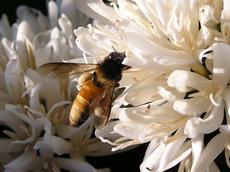More than bees
Honeybees are important pollinators – but not the only important ones, says a new study. For a rich harvest of various fruits and seeds, many other insects are more essential.

Markus Imhoof’s documentary More than Honey has been screened in Swiss cinemas for weeks. It is a homage to the diligent working animal and a lamentation of the depletion of bee populations all over the world. It claims that we owe a third of the food we eat to the industriousness of bees. Now, however, a study just published in the journal Science challenges this somewhat one-sided view.
Besides the domesticated
honeybee, there is also a wide variety of wild pollinators, such as
wild bees and bumblebees, but also flies and tiny gnats. Like
honeybees, they pollinate crops, thus making a sizeable contribution
to food security. Researchers have been studying how important these
other insects are for crops in different cultivation systems around
the globe. The study is the result of a collaboration between around
forty research groups from all continents, including ETH-Zurich
professor Jaboury Ghazoul with his Ecosystem Management Group.
Wild pollinators boost yield
The researchers gathered data on over 600 sites, the analysis of which revealed a definite trend applicable to all cultivation systems: the fruit set of crops increases if wild pollinators visit the flowers as well as honeybees. By the same token, the fruit set only increases in fourteen per cent of the cultivation systems examined if honey bees are predominantly used. The fruit set is the percentage of flowers from which fruit develops and ultimately makes up the harvest.
The study also reveals that wild insects are more effective pollinators than honeybees. If wild pollinators visit the same number of flowers as honeybees, the fruit set doubles. The more often wild pollinators visit flowers, the greater the harvest, even if honeybees were also frequent flower visitors. The variety of pollinators also seems to have a positive impact on the yield. The more diverse the pollinators were in a cultivation system, the greater the fruit set. Here too, the researchers discovered that this is independent of how frequently honeybees visit flowers.
Honeybees no substitute
Honeybees are often considered to be a substitute for wild pollinators. The results of the study, however, tell a different story: honeybees neither maximise pollination nor can they fully compensate for the contribution that a diverse pollinator community makes. This goes for different agricultural areas around the globe. In other words, without pollination by other insects, fruit sets and therefore harvests would be much smaller in many places. “We would lose a substantial part of the harvest if it weren’t for the wild pollinators,” stresses the ETH-Zurich professor.
Jaboury Ghazoul is therefore more concerned about insect diversity than the honeybee. “In Europe, many natural and semi-natural habitats of pollinating insects have been lost over the last few decades,” says the professor. As a result, the reliance on the honeybee and its services has increased. Honeybees and other insects complement each other. “Both pollinators provide the best pollination service together,” says Ghazoul.
The researchers therefore advocate preserving or re-establishing natural or semi-natural areas in agricultural areas. Instead of setting up monocultures, diverse cultivation areas and methods should be fostered in agricultural land. Without the ecological revaluation of cultivated land, we run the risk of losing many useful insects. Ghazoul emphasises, however, that conserving semi-natural areas for bees must be considered in the context of other aspects of farm management systems, and it has to be recognised that intensification also brings many agricultural benefits and efficiencies.
Take coffee, for instance
For
this meta-study, Ghazoul used data from a coffee-growing area in
India. India is the fourth largest coffee producer in the world and
coffee farmers are largely dependent on the income they make from
coffee. Researchers from Ghazoul’s group have been studying the
complex relationship between agricultural practices, the climate,
forest protection, bees and coffee production in Kodagu, a province
in the Western Ghats, for years.
Like domesticated honeybees, various species of wild bee play a key role in pollinating coffee flowers. Because domesticated honeybees have been depleted by a virus, the harvest now depends on wild pollinators more than ever. The population of the most important wild bee, Apis dorsata, however, is dependent on forest protection. Without big trees, where they hang their nests on thick branches, Apis dorsata cannot survive.
Further reading
Garibaldi LA et al. Wild pollinators enhance fruit set of crops regardless of honey-bee abundance. Science, 2013. Published online 28th February. DOI:10.1126/science.1230200







READER COMMENTS